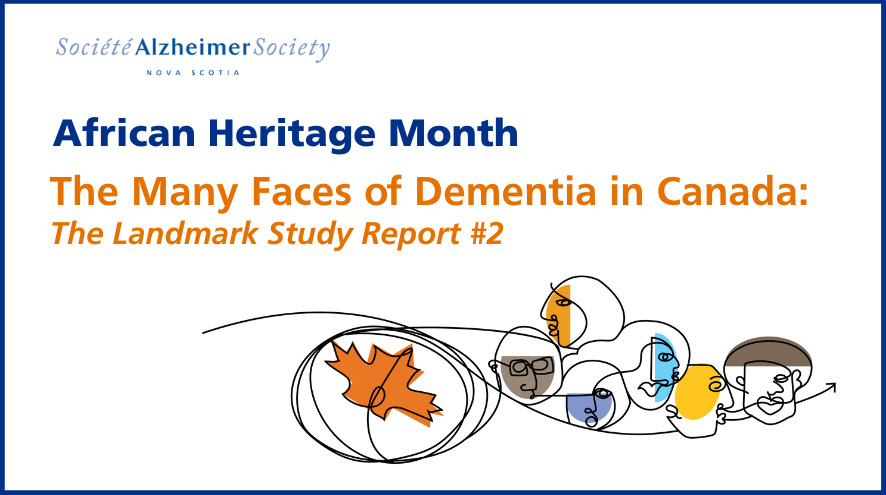African Heritage Month: The Many Faces of Dementia in Canada
Learn more about dementia and African Nova Scotians

In January 2024, the Alzheimer Society of Canada released the second volume of the Landmark Study, The Many Faces of Dementia in Canada.
Over the past year we have been sharing education summaries on each Chapter. You have had the opportunity to learn more about this study, what it means for Nova Scotians, and what resources are available to help. We have shared local statistics, identified resources, and heard from Nova Scotians about ways in which their cultures and social identities are related to their experience on the dementia journey.
Today we’re talking again about Chapter 3, Ethnic and Racial Diversity of People Affected by Dementia (read the chapter here). In honour of African Heritage Month, we’re learning a bit more about Dementia in Black Communities.
The report estimated that the number of people of African heritage living with dementia in Nova Scotia would increase by 100% between 2020 and 2050, compared to 87% in the general population.
This chapter covers aging and Canada’s multicultural population, hypothesizes why there are differences in dementia rates across ethnic and racial groups, explores differing levels of care and calls for more research.
This discussion occurs within a context and acknowledgement of the importance of the social determinants of health. The ability to mitigate risk, diagnose, and care for someone living with dementia all exist within a growing need of understanding the many intersections of our identities. These intersections affect dementia care and the need for increased research.
The Alzheimer Society of Nova Scotia has been working closely with African Nova Scotian communities for the many years to address these realities. We seek to listen to communities, address issue of inequity and deliver services to meet the culturally specific needs of African Nova Scotians.
“This research highlights the importance of dementia education within our province,” says Andrew Howe, Education & Engagement Coordinator for African Nova Scotian Communities. “Dispelling the stigma of dementia is so important in our Black communities because it is a big part of what holds people back from seeking out help and resources. By bringing people together with education sessions, we are able to foster both connection with, and between, clients and build a sense of belonging within community as well. As we anticipate an increase of people living with dementia in African Nova Scotian communities, we are working to support those already on the journey and equip others for the journey they might experience in the future.”
Click here for a fact sheet from Chapter 3 focusing on Dementia and African Nova Scotians, where you can learn more about the numbers and statistics.
Resources can be found here:
- Dementia & African Nova Scotians: Dementia information and resources specific to African Nova Scotians
- Dementia in the Black Community: This video series from the Alzheimer Society of Canada is a resource for health-care providers, care partners, people living with dementia, and anyone interested in understanding the unique experiences of the Black community with dementia.
- Experiences of dementia in the Black community: A Canadian perspective: In this edition of Dementia Talks! Canada we discussed the range of experiences and perspectives of dementia in Black communities in Canada.
- The Waldron Report: A report on the Experience of Black Canadians Living with Dementia and their Care Partners.
Stay tuned for our next blog in March that will be looking at Young Onset Dementia.
If you see yourself in this report, or are a community organization or healthcare provider and have suggestions on how we can better support you and your community, we invite you to contact us by email at alzheimer@asns.ca or phone at 1-800-611-6345.
Read the full report, The Many Faces of Dementia in Canada, here.
